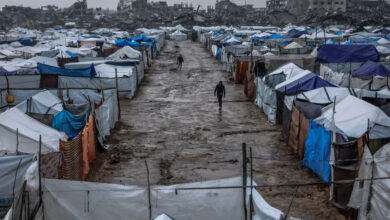COPENHAGEN – Prosperous countries have not lived up to their promises to help the poor, the UN declared Wednesday, saying poor people often go hungry because of polluted water, drought and other environmental factors that are increasing poverty.
In its annual report on the quality of life worldwide, the United Nations Development Program said more should be done to address international environmental concerns and that sustainability must become a way of life as the world population grows above 7 billion.
"The key finding of the report is that the very impressive long-term development progress that we have been able to document in low-income countries in recent decades may slow down or even be reversed unless we, as a world community, come to terms with these central environmental challenges, which include climate change but are not restricted to climate change," said William Orme, who oversees publication of the report.
The poorest countries, which tend to be tropical, arid and rural, are most vulnerable to extreme weather events including droughts and typhoons that impact crops, forest resources and fisheries, he told the UN launch of the report in New York.
Orme warned that "all these things will converge in a very negative way unless global action is taken."
UNDP Administrator Helen Clark said in the report's introduction that "sustainability is not exclusively or even primarily an environmental issue."
"It is fundamentally about how we choose to live our lives, with an awareness that everything we do has consequences for the seven billions of us here today, as well as for the billions more who will follow," she said.
The report noted that although aid to poorer countries grew 23 percent from 2005 to 2009, it was not enough.
"Rich countries have consistently failed to meet their stated pledges," including promises made by the G-8, the European Union European and the United Nations to give $100 billion a year by 2020 to fight the impact of climate change in developing countries.
"The pledges fall well short of estimated needs, and disbursements fall well short of pledges. Most of the 'new and additional' funds pledged at the 2009 UN Climate Change Conference in Copenhagen have not been delivered, and less than 8 percent of pledges for climate change were disbursed in 2010," the report said.
Last month, the world population hit 7 billion. The UN estimates the world's population will reach 8 billion by 2025 and 10 billion by 2083.
The UNDP report, published annually since 1990, said high living standards don't need to be carbon-fueled and follow the examples of the richest countries, adding CO2 emissions have been closely linked with national income growth.
Among the 187 nations surveyed, Norway, Australia and the Netherlands topped the annual Human Development Index while Congo, Niger and Burundi were listed last.
The United States was fourth, ahead of New Zealand and Canada, but when the index is adjusted for internal inequalities in health, education and income, some of the wealthiest nations drop out of the UNDP's top 20, the report showed.
The US falls to 23 on that list, South Korea drops from 15 to 32, and Israel, at 17, falls to 25.




